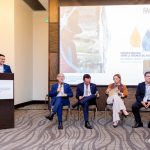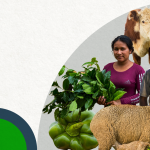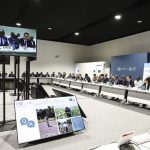FAO makes public policy recommendations for sustainable and efficient water management in Latin America and the Caribbean
- News
-
Mar 21
- Compartir publicación
In the framework of World Water Day, FAO published the document, prepared jointly with PLACA and GWP, "Towards a more efficient use of water", where the need to implement innovative strategies and effective policies in the face of the challenges of scarcity and drought is raised.
21/03/2025, Santiago
In the framework of World Water Day, established by the United Nations General Assembly to be commemorated on March 22, and whose theme this year is "Save the Glaciers", the Food and Agriculture Organization of the United Nations (FAO) published the report "Save the Glaciers". "Towards a more efficient use of Water".
The document warns how declining water resources are affecting agricultural production and food security in Latin America and the Caribbean, and presents six strategies to increase efficiency and ensure sustainability.
Under the premise that you cannot manage what you do not measure, the document prepared by FAO in conjunction with the Platform of Latin America and the Caribbean for Climate Action on Agriculture (PLACA) and the Global Water Partnership, points out that it is essential to make progress on the following public policy recommendations:
- Strengthening water governance by identifying key actors and involving multiple stakeholders, particularly the most vulnerable.
- Interinstitutional and intersectoral coordination mechanisms to advance in the monitoring of water resources.
- Use of technological tools such as satellite imagery and hydrometeorological monitoring platforms to improve water resource planning and management.
- Hydrological planning data to promote sustainable water use, integrating supply and withdrawal data at the territorial level, and disaggregating the information by basin.
- Control of extractions through concession registration systems, ensuring that the established limits are not exceeded and that environmental requirements are met.
- Promotion of climate resilient technologies such as planting and harvesting water, technified irrigation, hydroponic crops and the safe reuse of treated wastewater.
«Frente al cambio climático, debemos adoptar soluciones sostenibles que equilibren el uso del recurso con la conservación de los ecosistemas para lograr un Mejor Medio Ambiente, garantizando que ninguna comunidad quede atrás», dijo María Mercedes Proaño, Oficial de Financiamiento Climático de la FAO y Coordinadora de Mejor Medio Ambiente.
Related news
Cart
- Telegram
- Tumblr
- VKontakte
- Copy link
Subscribe to the Newsletter
Subscribe to PLACA's biannual newsletter and receive information on:
No spam · Cancel anytime



